#forged in the dark
Explore tagged Tumblr posts
Text
In the last few days, I've now had two run-ins with people on this site regarding the idea of a TTRPG's mechanics and rules impacting the roleplay aspect of said game. And from what I can tell, these people - and people like them - have the whole concept backwards.
I think people who only ever played D&D and games like it, people who never played a Powered by the Apocalypse or Forged in the Dark system, or any other system with narratively-minded mechanics, are under one false impression:
Mechanics exist to restrict.
Seeing how these people argue, what exactly they say, how they reason why "mechanics shouldn't get in the way of roleplaying," that seems to be their core idea: Rules and mechanics are necessary evils that exist solely to "balance" the game by restricting the things both players and GMs can do. The only reasons why someone would want to use mechanics in their RPG is to keep it from devolving into
"I shot you, you're dead!" "No, I'm wearing bulletproof armor!" "I didn't shoot bullets, I shot a laser!" "Well, the armor's also laserproof!" "Nuh-uh, my lasers are so hot that they melt any armor!" "My armor's a material that can't melt!" And so on. Because we have rules, the players can't just say "we beat this challenge", and neither can the GM say "you haven't beaten this challenge." Because the rules are clear, the rules are obvious, the rules tell you what you can and can't do, and that's it.
So obviously, when the idea of mechanics directly interacting with the roleplay - generally seen as the most free and creative part of a TTRPG - seems at best counterintuitive, at worst absolutely wrong. Hearing this idea, people might be inclined to think of a player saying "I'm gonna do X", just for the evil, restrictive mechanics to come in and say "no, you can't just do X! you first have to roll a Do X check! But you also did Y earlier, so you have to roll the Did Y Penalty Die, and if that one comes up higher than your Do X die, you have to look at this table and roll for your Doing X If You Previously Did Y Penalty! But, if you roll double on that roll..."
But like... that's not how it works. Roleplay-oriented mechanics don't exist to restrict people from roleplaying, they're there to encourage people to roleplay!
Let's go with a really good example for this: The flashback mechanic from Blades in the Dark (and games based on Blades in the Dark).
In BitD, you can declare a flashback to an earlier point in time. Could be five minutes ago, could be fifty years ago, doesn't matter. You declare a flashback, you describe the scene, you take some stress (the equivalent of damage) and now you have some kind of edge in the present, justified by what happened in the flashback. For example, in the Steeplechase campaign of the Adventure Zone podcast, there was a scene where the PCs confronted a character who ended up making a scandalous confession. One of the players declared a flashback, establishing that, just before they walked in, his character had pressed the record button on a portable recording device hidden in his inner coat pocket. Boom, now they have a recording of the confession.
How many times have you done something like this in a D&D game? How many times did your DM let you do this? I think for most players, that number is pretty low. And for two reasons:
The first, admittedly, has to do with restrictions. If you could just declare that your character actually stole the key to the door you're in front of in an off-screen moment earlier, that would be pretty bonkers. Insanely powerful. But, because BitD has specific mechanics built around flashbacks, there are restrictions to it, so it's a viable option without being overpowered.
But secondly, I think the far more prevalent reason as to why players in games without bespoke flashback mechanics don't utilize flashbacks is because they simply don't even think of them as an option. And that's another thing mechanics can do: Tell players what they (or their characters) can do!
Like, it's generally accepted that the players only control what their characters do, and the GM has power over everything else. That's a base assumption, so most players would never think of establishing facts about the larger world, the NPCs, etc. But there are games that have explicit mechanics for that!
Let's take Fabula Ultima as another example: In that game, you can get "Fabula Points" through certain means. They can then spend those points to do a variety of things. What's literally the first thing on the list of things Fabula Points let you do? "Alter the Story - Alter an existing element or add a new element." I've heard people use this to decide that one of the enemies their group was just about to fight was actually their character's relative, which allowed them to resolve the situation peacefully. I again ask: In your average D&D session, how likely is it that a player would just say "that guy is my cousin"? And if they did, how likely is it that the GM accepts that? But thanks to the Fabula Point mechanic making this an explicit option, thanks to rules explicitly saying "players are allowed to do this", it opens up so many possibilities for story developments that simply would not happen if the GM was the only one allowed to do these things.
And it's only possible because the mechanics say it is. Just how your wizard casting fireball is only possible because the mechanics say it is.
#ttrpg#ttrpgs#tabletop rpg#tabletop rpgs#blades in the dark#forged in the dark#bitd#fitd#fabula ultima
717 notes
·
View notes
Text
A bit ago there was a Polygon article about how indie TTRPGs should "get loud" while D&D flounders. Here's a start to that! There are 36 great games in here, including my games Beam Saber and The Pack, so get it while you can!
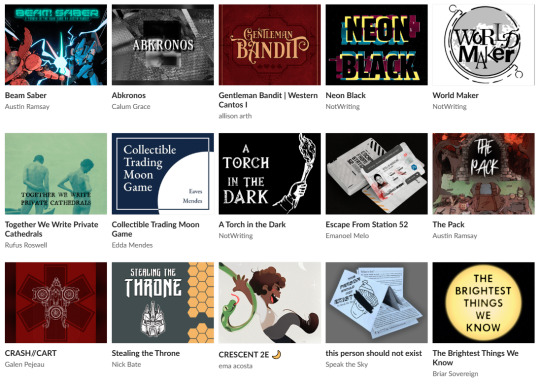
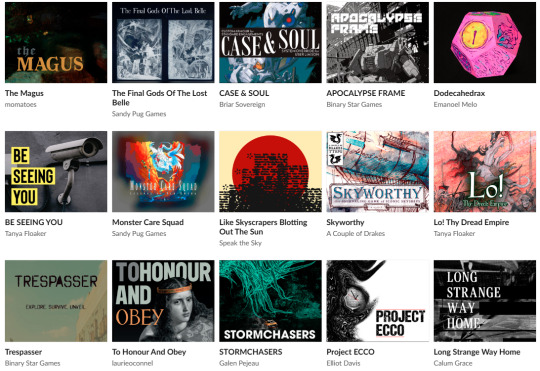
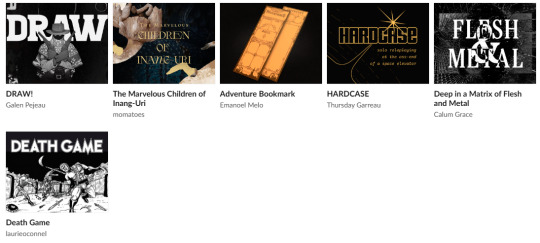
114 notes
·
View notes
Text
Have you played THE WILDSEA
By Felix Isaacs

The world is covered in a mile high sea of trees and the remnants of civilization sail the wooden waves on chainsaw ships. Players can choose to play humans with an affinity for spirits, cactus people, moth people, spider hive minds in skin/silk suits, jelly people, mushrooms, or ensouled wrecks/machines.
194 notes
·
View notes
Text

@martianworder asked me about this on my Forged in the Dark post, so here we go!
Clocks
So Clocks have been a tool that have been used before and outside of Blades in the Dark, but BitD was where I think they were made really popular.



Golem Clocks designed by cmartins on Itch.io
For all intents and purposes, a Clock is just a track that you fill, but in some cases it's preferred over a track because it fills less space, and it's easy to just draw a clock on a piece of paper to help you keep track of something as you play.
A Clock can be more than just a track. It can be a countdown, a timer, or a representation of a person or faction's goals. The larger the Clock, the bigger task it is. Here are some examples of how you could use them.

A Healing project clock from Blades in the Dark.
A player could have a project Clock that they fill over the course of many sessions. Perhaps they want to research a cure for a vampire virus that is threatening a loved one. The GM would ask them to make a research roll every downtime, and how successful they are indicates how many slices they fill - effectively, how much progress they make towards finding a cure.
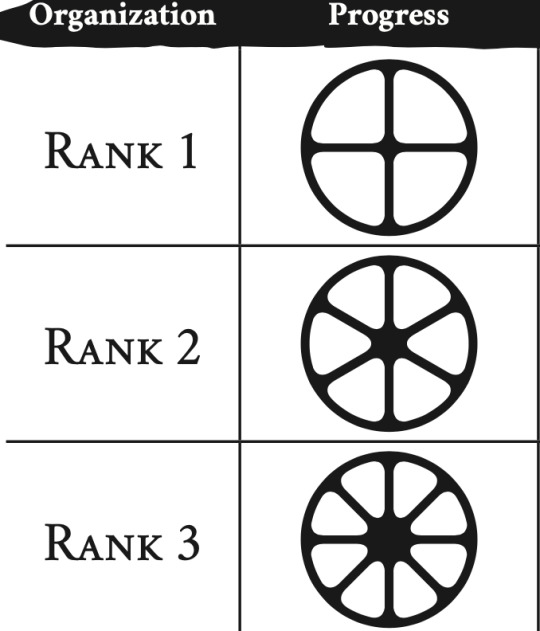
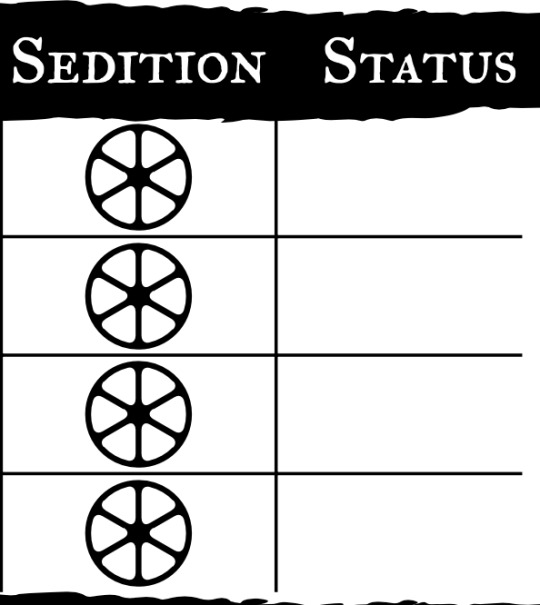
Rebellion and Sedition Clocks for Brinkwood: Blood of Tyrants.
A play group might use a Clock to track a common goal, such as winning over a number of anarchists to help take down a mega-corporation. If this is a campaign-long goal, you might use a series of linked clocks to represent the jailbreak you need to assist before you can win over a computer hacker, and then the massive hacking project you need to support before you can overwhelm the corpo servers.

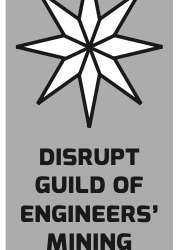

Faction Clocks from Scum & Villainy.
A GM might use a Clock to track the work a Faction makes towards their goal. Every downtime section, they GM might roll to see how successful the Faction is, or simply tick one slice of the clock if the Faction has no reason not to be able to do what they want. If the Faction is allowed to work unimpeded by the PC's, they might eventually do something that changes the world around them, for better or worse.
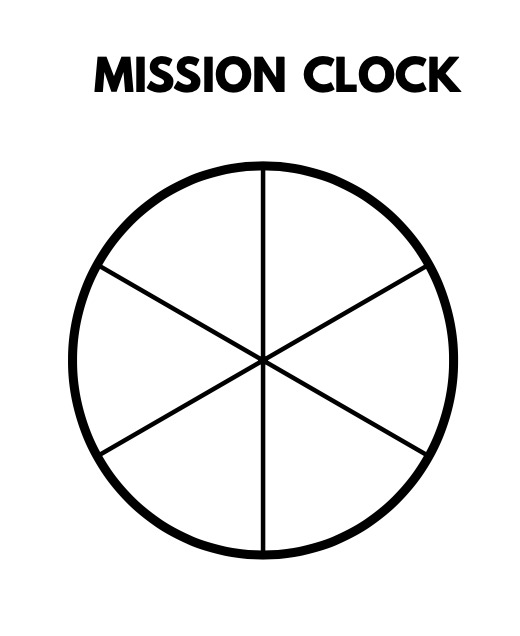

Mission Clock from External Containment Bureau and Doomsday Clock from Apocalypse Keys.
Clocks might also be used as a timer, to indicate when something terrible might happen, or when the group's time is up. This might be the amount of time before a murderer next strikes, before the haunted house claims another victim, or before the world begins to end. In some games, specific points in the clock (such as halfway, or a quarter of the way through) may trigger special events that give the PC's more information, or remind the group that the pressure is really on.

Clocks for Protect the Child.
All in all, Clocks are a great visual tool to help you and your game group keep track of what's going on in the fiction, and it can also help you keep track of a number of narrative threads in a fairly condensed space. Even if they're not built into the game you're currently running or playing, I think they're a fairly easy addition, and can certainly help with bookkeeping!
550 notes
·
View notes
Text

this is such a good guide for GMs of pbta/fitd.
Source: Arkadia by andy
385 notes
·
View notes
Text
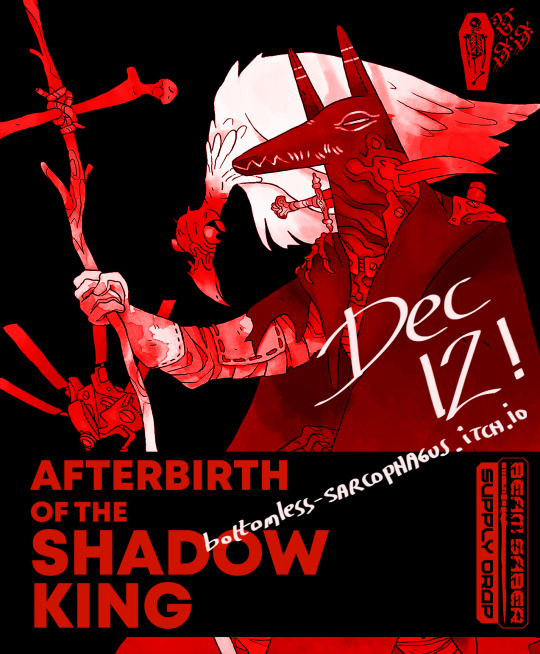


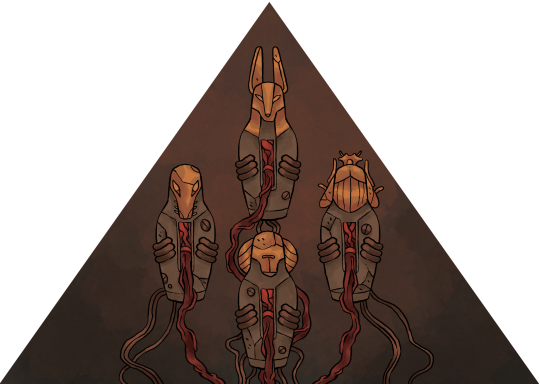

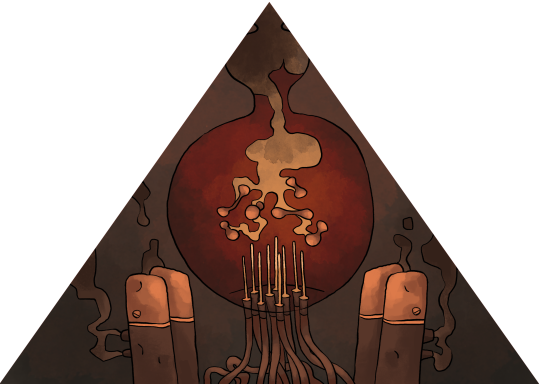
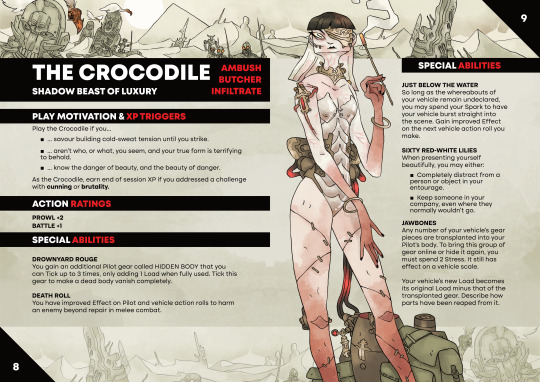
AFTERBIRTH OF THE SHADOW KING (2023) Sci-Fi/Post-Apocalyptic Horror Expansion by Rowan A. for Austin Ramsay's FitD mecha game Beam Saber.
WRITING, LAYOUT, ILLUSTRATION
#tabletop rpg#ttrpg#beam saber#forged in the dark#mecha rpg#post apocalyptic#indie ttrpg#ttrpg art#zine#zine layout#itch.io
474 notes
·
View notes
Text
As the Sun Forever Sets - Terror in the time of the Telegraph
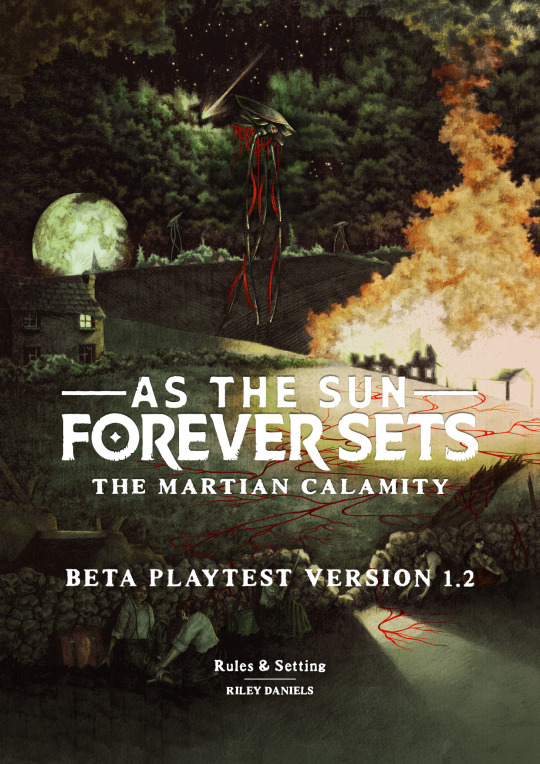
It’s nuts I’ve been working on this game for over 4 years at this point. As the Sun Forever Sets is for sure my biggest and most capital G Game. It even has a publisher and everything. It’s also my first game! Wow! It's been tough, though. We'll get into it!
Britain, 1899
As the Sun Forever Sets is a survival horror sandbox based on the War of the Worlds, utilises the Forged in the Dark ruleset, and is about ordinary people surviving a Martian invasion of Victorian era Britain. We play to find out how they rise to meet the storm of destruction, the ways in which it shapes them, and if they survive to see a new world emerge, or die amidst the rubble of the old.
In the last years of Queen Victoria’s reign, the British Empire stretches across a quarter of the globe, and under the guise of genteel progress and civilisation, it commits theft and murder on a global scale. Britain itself is on the verge of the modern era, the Second Industrial Revolution pushing people into the cities to drive the factories and forges owned by the greedy industrialist class. But beyond the common causes of humanity and unbeknownst to the men who impose their rule over it, vast wheels have begun their inexorable turning. Across 40 million miles of void, the Martian invasion hurtles Earthward. Screaming across the stars, instruments of annihilation unlike anything believed possible lie ready for assembly, alongside the Martians themselves. They are truly inscrutable beings, but their intent is as clear as it is terrible – they will suck the literal and figurative blood from the Earth, and nothing less than the complete and utter subjugation of humanity will be enough.
If this sounds cool to you... well, you gotta wait, it’s not done yet. Sorry! But you can come and hang out in the Sick Sad Games discord, where I post excerpts and occasionally organise playtests.
The Hard Times of (Old) England
Be warned, this is a long one - over 4000 words (if you don't have a Tumblr account, you won't get to the end before it starts bugging you to register one, so go read this on Medium instead.) It turns out when you work on a game for a long time, you have a lot to say about it. Strap in, grab your gin and laudanum, and let’s destroy an evil empire just by existing.
Thanks to the wonderful @hendrik-ten-napel for taking a look over my disorganised thoughts.
(Potential) Spoilers for: The Bear, The War of the Worlds, The Last of Us, Children of Men, Threads, When the Wind Blows, Amnesia: A Machine for Pigs, The Thing.
Roleplay in the Pre-Post-Apocalypse
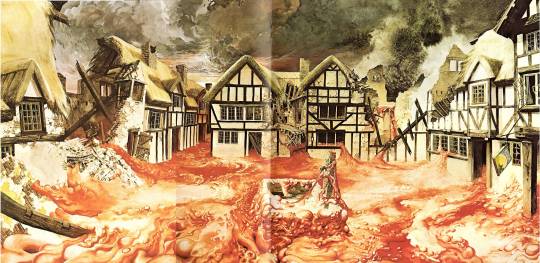
TTRPGs love a good post apocalypse. It's understandable - gas up and ride glorious on the legally distinct fury road, run a commune of like minded weirdos in the ashes of the old world, go digging through retro-futuristic ruins to find retro-futuristic treasures. Who wouldn't want to do any of these? But As the Sun Forever Sets is about an apocalypse as it begins, not after it’s over.
There's a lot of crossover, of course. There’s a focus on similar things - disaster and spectacle, relationships and trust, scavenging and survival. But the bonus of the world not yet being over, is that we get to roleplay out dealing with that terrible, inexorable reality.
youtube
HG Wells wrote a book about blowing up all the places he used to live, and it's a banger. I was surprised to find there wasn't a TTRPG based on the War of the Worlds, being the tantalisingly public domain ur-alien invasion story it is. As the Sun Forever Sets is very explicitly an adaption of it, to the point that before I came up with the name it almost got released as The War of the Worlds: The Roleplaying Game (lol). I'm glad I didn't, doing my own thing has meant both me and the people playing are way more free to fuck around without the expectation that it must adhere to a canon.
The book is good, strikingly modern feeling in parts, and obviously massively influential - so much science fiction can be traced back to our nameless Narrators tormentuous trek across the south of England. But Wells’ prose is typical Victorian - overly wordy and florid (any book that contains the word “ejaculating” meaning “to shout” might be difficult for readers who aren’t used to the style), so when it comes to recommending an actual adaptation, there’s only one true king. Whenever I bring up Jeff Wayne’s The War of the Worlds, the usual reaction from anyone outside of the UK is to say "... they made a what?"
My mom was very keen to get me into musicals, but nothing really stuck until she tried this, the secret best War of the Worlds adaption (sorry Steven Spielberg, but you were doomed from the start.) It's the bombast and drama you'd expect from a disaster film, the horror and pathos of Wells’ classic, all expressed through vivid narration and sick nasty prog rock - wailing guitar and crunchy 70's synths operating at full effect. It's not completely faithful to the book, it doesn't matter. It’s the best.
youtube
Ah yes, the film bro's favourite mid 2000's film. Did you see that sick oner? That’s six minutes without a cut, that means the film’s good right? Children of Men is a slow burn apocalypse, dressed up like a world that’s already ended. Plenty has been written about all the little ways the film is prescient about the state of the UK - the slow belly-crawl into facism and nationalist fervour, the particularly British decay and class divide exacerbated by the desperate times, even the willful ignorance and the explicit sense that everyone’s just given up, it’s all here.
All that thematic stuff seems like it’d be really relevant to As the Sun Forever Sets, right?
Unfortunately, we are in fact here to talk about the long takes. The unbroken moment-to-moment action scenes evoke The War of the Worlds to a tee. Theo navigates danger with the same fraught tactical tension as War of the World's Narrator - dashing between doorways, groping for an axe handle in the darkness, desperately trying to start a car as assailants sprint towards him. What’s the best way out of this situation? How do I get from here to where I need to be? He lives his life in rolling, fleeting 5 second intervals, because he’s forgotten what it means to think in the long term - about the future, and what it might hold.
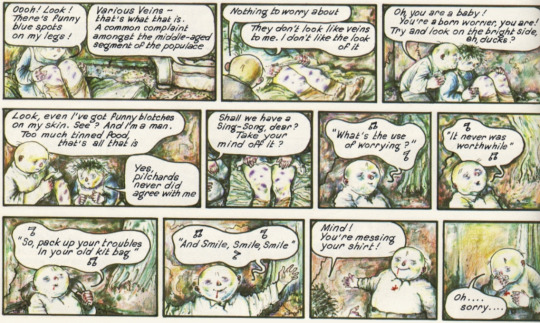
I was always fascinated and terrified by the idea of nuclear war. I guess it comes from watching a lot of 90’s disaster movies, but those are often ultimately fun romps where the day gets saved at the end, or at least the main characters find themselves alive and well at the end of the saga of destruction. Instead, As the Sun Forever Sets asks you to reflect on the horror and sadness present at the end of the world. Things are going to change forever, and change is always hard.
There’s not many clips of Threads and When the Wind Blows online, so it’s a little hard to demonstrate their particular nuclear inflected pitch black darkness. They’re grim - Grave of the Fireflies grim - differing in focus but united in their horrible impact.
When the Wind Blows is a story of an elderly couple living in rural England when the bombs drop, based on the comic by Raymond Briggs. Yes, The Snowman’s Raymond Briggs made a film about 2 lovely grandparents dying of acute radiation poisoning. Jim and Hilda are completely unprepared for what’s to come, their only reference is the Blitz - terrible in its own way, but not a patch on the scale of death they’re about to experience.
They survive the blast and wait for the good old British Government to arrive to save them, as it did in the 40’s. Slowly liquifying in the nuclear fallout, they hold onto each other and keep their spirits up, eventually making the decision to clamber into the paper sacks they mistakenly believed might protect them from the blast. Clutching their medical cards and birth certificates (for the ambulance, sure to be along any minute now), Jim mumbles painfully through a final prayer that morphs into a misremembered Charge of the Light Brigade, and they slip into a perpetual slumber together.
The most tragic part is Jim and Hilda’s unshakeable faith that their government is there for them - ready to catch them when they fall - borne out of Britain’s post WW2 renewal but absent in the 1980’s of the film’s plot, and the Britain of today. It’s a masterful film, shockingly sad, but the shock is the point.

Instead of aiming for your heart, Threads aims for the head. It’s a drama that aims to be as accurate as possible to government research into what a nuclear war might look like, plainly and forensically setting it out without any thought of softening these hard facts for its audience. Rather than focusing on a personal story, Threads flits around several groups of characters - minor government figures and ordinary families. Like Jim and Hilda, they too are woefully unprepared for the end of the world, and those in charge know there’s no way the UK could ever be ready for such a thing.
As mundane life is quietly intruded upon by news updates detailing far off geopolitics and the subsequent escalation that leads to war, the tension rises subtly then suddenly, like a spacecraft on the launchpad. People we’ve seen pottering about their normal lives are maimed and evaporated in the subsequent shocking nuclear exchange, whilst stark statistics flash on the screen - the hundreds of thousands instantly killed, how long the millions more fatally irradiated have left to live, the woefully inadequate tonnage of stockpiled food to feed those who survive. Each zero hits like a gutpunch.
And when you think the film must nearly be over, it keeps going. 1 week later. 1 year later. Threads grinds to an excruciating halt 13 years after the bombs fall, after year upon year of failed harvests from a destroyed earth barely able to support a population level equivalent to medieval Britain. At one point, mute children watch a warped and scratchy VHS of classic kids educational programme Words and Pictures on a TV powered by a steam generator.
The friendly presenter spells out the word “cat” through the thick veil of static, accompanied by a picture of one - an animal the children watching will likely never see. As they watch with blank, emotionless faces, the image of the cat fades to one of its skeletal form. “A cat’s skeleton” the presenter enthusiastically intones. The unrelenting bleakness might feel like a punishment, but Threads doesn’t mean it to be. This is just what would happen, after all.
Love in the time of the Heat-ray

In fact, someone in a Reddit thread said As the Sun Forever Sets “wasn’t just endless misery” and I’m glad that comes across. I wanted there to be moments of tenderness, quiet joy, anger, frustration, love and loss to punctuate the action and the horror.
People are messy and complicated even at the best of times. Under pressure, this is amplified a thousandfold - a little crush becomes a whirlwind romance, small disagreements become full blown fights, and not fully understanding someone might transform them into an enemy in your head.
youtube
The little town Bill conspires to be left alone in ends up comparatively untouched by the horrors going on elsewhere, as untouched as anywhere can be in The Last of Us. He hated the world anyways - so he isolates himself as he prepares for it to end, and it makes sense that his life only really begins as the show does. When Frank arrives, Bill is forced not to just engage with the broader world outside of his little enclave, but in the act of truly living in it.
There’s no prepper’s guide to romance. A human heart can’t be field stripped for maintenance. By choosing to exist as a vulnerable, emotional being, Bill opens himself up to a different kind of apocalypse. Frank becomes the flowering vines that slowly crack the flat concrete wall of a world that Bill created, and when those vines die, the wall can only crumble. It’s so fraught and lovely, delicately yet absolutely gut wrenching. At least their apocalypse was one they decided to have together.
“I’m old. I’m satisfied. And you… were my purpose.” - "Long Long Time”, The Last of Us
youtube
While several of my TTRPG writing friends were gushing about how great The Bear is, Em Acosta, author of the wonderfully inspirational Exile pointed out something super interesting - a lot of the show is about how you deal with people you’ve found yourself stuck with. No matter how much they piss you off, or whatever they do wrong, there’s something that means you can’t ever let them truly exit your life. They’re there, like it or not, until the bitter end.
Turns out this is very similar to how As the Sun Forever Sets handles Player Character relationships. In both it and The Bear, nothing’s ever truly resolved between characters - every relationship is like a cooking pot perpetually simmering. You might’ve apologised, made a truce, or just ignored your issues for so long that they seem to disappear, but no matter what, you’ve got to keep your eye on that pot.
Because suddenly a crisis will hit, and someone says something, or a diceroll comes up bad and all of a sudden the pot boils over and things are once again fucked. You storm out, start screaming, throw a fork. Even in the worst case scenario where a Character leaves because they’re absolutely sick of the rest of the group, they might show up at the end of the game for one last scene. Who knows how you’ll all feel at the end - nothing is ever truly fixed, and only the dead are truly broken.
“I quit, chef, is what’s going on. You are an excellent chef. You are also a piece of shit. This isn’t on me. Goodbye." - “The Review”, The Bear
youtube
I’ve talked about The Thing a little before, John Carpenters sweaty, paranoid antarctic masterpiece. Along with the incredible effects and the (mostly) restrained use of action and bombast, the thing that makes... The Thing work is that the staff of the stricken research base lack any and all emotional intelligence.
It’s sort of the ultimate reverse Dudes Rock movie. Nobody knows anything about each other, so when their bodies and minds are colonised by the titular chameleon from outer space, they’re just another stranger to the rest of the crew. I’d ask you a question only you would know the answer to, but uh.. I don’t know anything about you. Whoops!
Over the course of the film, the whole operation falls apart as they try their best to work together to deal with the alien interloper, but their complete lack of ability to trust or relate to each other - present even before the crisis they find themselves in - is their ultimate downfall.
That final excellent shot of MacReady and Childs sat in the snow at the end of the film as their compound burns around them is the subject of a lot of unnecessary theorycrafting youtube videos, which kind of misses the point. Each suspects the other, but ultimately it doesn’t matter if one of them’s a Thing. One stranger is the same as another. Why bother getting to know each other now?
“Well...What do we do?” “Why don't we just... wait here for a little while? See what happens.” - Childs and Macready, The Thing
Science Fiction Revenge Fantasy

I’m not a historian, but the parallels between 1899 and now are pretty plain to see. Increasing class disparity, a lack of political will to help those in need, rampant cronyism and profiteering. As long as you’re in the place for it, roleplaying in a fictionalised version of the past to air out the issues of the present can be super fun and cathartic. You’re not expected to get a degree in British history to make it work, either.
The title is a play on the phrase “The Sun Never Set on the British Empire”, and it’s plainly stated in the book that Britains Empire acted as a mechanism of genocidal oppression, and that the Martians are here to end it - intentionally or not. It’s appealing as a premise on the face of it, but it goes a little deeper. Memories of Empire echo across time in Britain like the ringing of a malevolent bell, a cause celebre for braying Tories and fascistic right wing cunts (two very close circles in the venn diagram.)
We used to be a great country before this woke nonsense. Things were better back in the old days. The DEI contingent is trying to destroy our noble past. Yada yada yada, fuck offff. I’m sure someone somewhere will accuse me of “wokewashing” the past for including explicitly trans and queer characters as part of the book, along with the historical facts around how we fit into the oppressive Victorian conception of sex and gender. Unfortunately for them, we’ve always been here.
To be a little pretentious about it, every game of As the Sun Forever Sets reaches back into the past and cuts the myth of a glorious and benevolent Empire, and the good old days enjoyed within it off at the neck, purely in the act of beginning one. That sparks a little joy for me. Destroying a racists dream is fun, even if it’s only in the abstract.
youtube
A horror game about the most literalist Victorian industrialist imaginable hearing the phrase “Eat the rich” and getting right on that. I’ve not played Amnesia: A Machine for Pigs despite fond (??) memories of playing The Dark Descent in a room full of jumpy friends, and seeing Dear Esther played live on stage, with a live orchestra and narrator - an exquisite way to experience that game.
The mechanical chops of Frictional Games mixed with the narrative verve of The Chinese Room, how could this game be anything less than incredible?
After The Dark Descent I fell off’ve the “scary guy chases you around” genre of game until Alien: Isolation revitalised it, and the reviews of A Machine for Pigs were mixed - kind of boring, middling gameplay, too dark - so I never went back. I was planning on writing a little about its vibe - dark, gothic Victoriana that rhymes nicely with As the Sun Forever Sets - but after a bit of research, Mandus’ quest for his missing sons strikes an unexpectedly resonant and terrible chord.
The writing and voice acting is phenomenal, Mandus’ split consciousness - the self you play and the other half of him that’s seen the horrors of the forthcoming 20th Century and is compelled to act, imbued into the myopic machine he built - is extremely compelling. He feels compassion for the poor and wants to save them, but they fill him with fear and disgust. He knows the industrialist class is killing the world, but feels a deep shame in the fact that he counts himself amongst them. So his machine grinds the rich into meat for the poor, who it distorts into grotesque pig homunculi and forces them to operate the machine’s inscrutable workings.
It’s Mandus’ twisted way of saving the world - kill the rich for their crimes, enslave the poor for their own good, all hail the new machine/god/manager of the 20th century. It’s a neat reflection of the way modern politicians contort themselves to the whims of big business and AI snake oil salesmen to avoid doing the simple and obvious things that’d better the world. It’s a nightmarish refutation of Victorian Liberalism, that only the upper class know how to fix the problems of the lower class. It’s brilliant, and we should play it.
"Do you hear me Mandus? This is what you planned! This world is a machine! A Machine for Pigs! Fit only for the slaughtering of pigs! Whores, beggars, orphans, filthy degenerates. Pigs all. But I will purify the streets, cleanse this city, set the great industry free. I will clean the world, make it pure." - The Machine, A Machine for Pigs
Song of the Year, of the Century
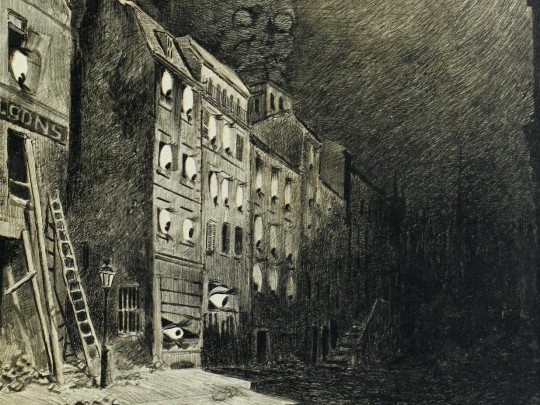
Not long after I came out as trans, I was asked what (in an ideal world) would make transition easier. I replied - never having to leave the house. One day I'd shut the front door as a man and another day, months or years later, I'd open it again as a woman, neatly sidestepping the terror of being perceived in a notoriously transphobic Britain.
In 2020 I shut that door and didn't open it for 4 months. At work, I remember calling the nearby shelter to donate our excess hand sanitizer and toilet roll, figuring out at the last second how support workers could take calls from their already isolated clients via their mobile phones, and fixating on the steady stream of scared coworkers leaving early. Tearfully, I felt the urge to hug those that remained as we locked up, before we remembered we probably shouldn't.
I've never been more aware of the minutia of moving through a space on the way home - How many people had their hands on this handrail? Have I touched my mouth or eyes without realising? Is anyone in the office already sick? Or on this train? How many more people are going to die? - My heart was in my chest, I heard the blood whoosh through my head to the beat of my steps on the pavement. At home, I realised my boyfriend had to go into work the next day. After he went to sleep, terrified he might die, I cried.
"I remember I felt an extraordinary persuasion that I was being played with, that presently, when I was upon the very verge of safety, this mysterious death—as swift as the passage of light—would leap after me from the pit about the cylinder, and strike me down." - "The Heat Ray", The War of the Worlds
Writing As the Sun Forever Sets was my way of coping with the disconnect with the world I felt, the fear of both Covid and the rising transphobia kept me inside even as the lockdowns eased. That feeling of throbbing death creeping at the window took a long time to wrestle under control, and getting deeply obsessed with a big project became part of that process. It seems incredibly maudlin to make a TTRPG dealing with darkness and death during a pandemic that killed (and continues to kill) millions of people, but I suppose I’m kind of a maudlin person.
youtube
“I haven't written a song in a month, So I'm playing the same chords again. I know I need to get lost in the moment, But I get lost before it begins. Fingers stretching out into space. Reaching as a thought slips away.”
It also burnt me the fuck out. After years of constant work and testing (beginning long before Evil Hat picked up the game), I ran out of steam. I spent the months after Evil Hat’s public playtest ended not really able to write anything ATSFS related at all. The game kind of froze - I knew what I wanted to change or fix or add, but the moment the google doc opened I couldn’t make myself start typing. It was incredibly frustrating to have the switch flip from endless obsessive writing to constant nothing, and I don’t think I truly recognised the burnout I was feeling until recently. It turns out spending years staying up past midnight writing is bad, who know!
youtube
A lot of Forged in the Dark games don’t get finished (or more accurately, get stuck in perpetual development), something that the excellent and dearly missed +1 Forward podcast recognised in their episode collecting their thoughts on the FITD games they looked at back in 2021. I think that’s because, at least to me, writing a Forged in the Dark game is like trying to hold a plate of spaghetti without the plate. It’s deceptively simple at its heart, but the system squirms when you poke at it - write one thing and it affects 3 other things. Tug one piece of pasta out and you lose a meatball without realising it.
When I listened to that episode, I took it as a challenge. Part of me now wonders if it was a curse. I'm being hyperbolic, of course. But a little part of me did think it might be better to give the game up.
That’s not going to be As the Sun Forever Sets' fate, thankfully. Evil Hat has been there to support me when I’ve felt guilty about shifting another deadline or replying to a check-in email with another late “Not much progress this month, sorry!” The frozen writers block is thawing, and I’m so tantalisingly close to finishing the final text. This blog is part of that process, another chip in the icy dam.
The wheels of dread Martian terror turn once again, and it feels good. Part of that is down to not beating myself up about a lack of progress. The more important part came when I realised I felt able to return to the world again - living in it, not hiding from it. Staying connected to it, even when there's times I'm not able to inhabit it physically. Covid, Britains particular brand of transphobic brainworms, and the shadow of Empire all continue to exist, and so do I - a weird maudlin transsexual woman - in spite of them all.
“The day seemed, by contrast with my recent confinement, dazzlingly bright, the sky a glowing blue. A gentle breeze kept the red weed that covered every scrap of unoccupied ground gently swaying. And oh! the sweetness of the air!” - “The Stillness”, The War of the Worlds
You made it!
Thanks for sticking with my messy thoughts. If what I talked about here sounds cool to you, please stop by the Discord, we'd love to have you. Look forward to seeing As the Sun Forever Sets come to a crowdfunding platform of Evil Hat's choice (I assume backerkit) at some point in the future ♥.
#ttrpg#indie ttrpg#forged in the dark#horror#war of the worlds#ttrpg design#science fiction#incredible self indulgence#as the sun forever sets
107 notes
·
View notes
Video
youtube
Slugblaster, by Wilkie's Candy Lab, is a FitD narrative TTRPG about you playing as a bunch of teenage hoverboarders sneaking into other dimensions to explore, film, go viral, and get away from troubles at home.
It's stupid, it got parent groups in a panic, it's the coolest thing ever, and it's called Slugblasting!
47 notes
·
View notes
Text
I wrote a mini rpg adventure zine about fighting ghosts in the most haunted train station restroom in the world for the Tiny World TTRPG jam
80 notes
·
View notes
Text
Rockets Underground - A Pokemon Fan RPG
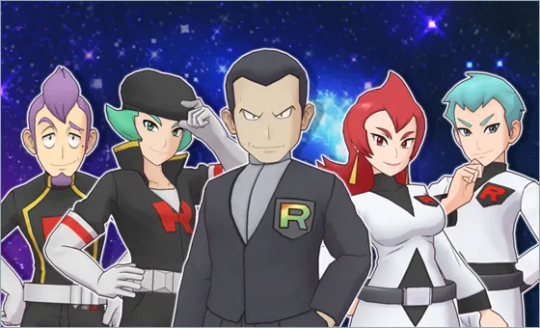
This is a framework for Blades in the Dark where you play Team Rocket Grunts in Goldenrod City. If you want something sillier and simpler than vanilla blades, and also Pokemon, check it out!
This is a culmination of many, many years of fanfiction, role play, game design, and just generally being a Pokemaniac for most of my life. I hope people have fun with it -- because I sure did!
Read It Here!
Rockets Underground has one of my favorite ttrpg rules I've ever written from a simulationist perspective. The Battle Roll is how you use your (weak, standard-issue) Pokemon to fight. It's a less forgiving Fortune Roll:

Playtesters either got it or they didn't. Some were like, "I want to be able to actually use my Pokemon battle!" And I was like, "That's not this game! Have you ever seen a grunt win a pokemon battle before?"
If you play it, please tell me how it went!!
75 notes
·
View notes
Text
Ex Materia Reveal
Time to post about Ex Materia!
I've alluded to this game a few times here and there, but here's the pitch:
Play as debt-ridden Freelancers who pilot drone frames on extraction missions on a strange space structure.
Playbooks are semi-modular, split across your single Freelancer, and as many different frames as you can afford. Mix-and-match!
Frames are called Archons, and are going to be sci-fi funky. As a fun little preview, each Archon has what's called a Hebdomad Core, which is in-universe, the strange engine that powers them, and mechanically speaking, tied to "devil's bargains".
Missions are meant to be easy to set up and get running. They're going to be another experiment in procedural tools, and the goal is to have different "zones" be responsive to player actions.
Sponsors are who you owe your debt to, but can also provide powerful (but temporary!) augments and stratagems during missions. Will you deepen you debt to get some extra dice?
And those're the central ideas that I'm building with.
Now to talk at least a little bit what makes this game different from other Forged in the Dark games.
Archons don't have actions or attributes, they have modules.
Harm is no longer a set of boxes, it's split across two fallout clocks.
Specific downtime actions are unlockable and tied to specific locations on your (space station? space ship? haven't decided yet on that).
Freelancers don't have Stress, but they do have Bleed.
All in all, it's a lot of remixing different FitD mechanics to better suit the game goals and support a slightly different style of play.
So, specifics: Archons don't have actions or attributes, they have modules. Freelancers have actions in the expected FitD way, but Archons have a set of gear/abilities that function like actions. Each Archon has a limited memory, with modules (among other things) taking up space. Modules can be anything from "Cool Gun" to "Speed Boost" to "Cool Data Analyzer", and the rating you have in those modules gives you how many dice you roll. Want to solve a problem with your Cool Gun? If you have two points there, you get 2d6, so on and so forth. These modules also function as an Archons abilities, but in a more freeform way.
Harm is no longer a set of boxes, it's split across two fallout clocks. This is going to manifest as a simplified version of what I have cooking for Unnamed Furry Crime game, but the gist is, you have a Body+Mind clock, and a Social+Financial clock. Taking harm in any way (getting hit, spending money, burning bridges) ticks those clocks. When one fills, you get hit with a significant fallout that is going to take some time-investment to clear or fix. You can also increase the size of your clocks with advancements.
The idea is that, at least in the moment, the harm matters less than the accumulation of too much harm which then ends up breaking you. I'm also just kind of pleased with, in a game where characters are driven at least in part by debt, spending money counts as harm.
Downtime and Bleed are still cooking a bit, so I'll save those for later (plus more on the rest of the game as it develops).
The Big Goal for Ex Materia is to get a beta version released in the next several months, and then a final release later in the year. So keep an eye out for more info 👀
42 notes
·
View notes
Text
It's Itch Creators' Day and like every other seller on the site I'm here to say that now is a great time to buy my stuff!
Want mechs?
I've got mechs!
Want a dungeon crawl?
Got that too!
Horror?
You know it!
What about PvP?
Get out a timer and put up yer dukes!
Want to be cartoon heroes?
You got it!
How about anime heroes instead?
Also covered!
Want some noir vibes?
Grab your Spindlewheel deck* and click on through!
(*Spindlewheel deck not included nor required but really adds to the mood)
How about racing and fast cars?
Get your Family and/or 3rd St gang together and roll some dice!
How about more mechs? Even weirder ones?
There's a whole collection of supplements for Beam Saber by myself AND other designers! So don't just buy my stuff but their work too!
Lastly, don't forget to let your favourite game designers know that you like their work. Comment on the Itch page, write a review, leave 5 stars, and, most importantly, tell your friends! Word of mouth does wonders for us!
Have fun!
#ttrpg#indie ttrpg#itch.io#itch Creators' Day#Creators' Day#mecha#horror ttrpg#forged in the dark#beam saber
70 notes
·
View notes
Text
Have you played BLADES IN THE DARK ?
By John Harper

Blades in the Dark is a tabletop role-playing game about a crew of daring scoundrels seeking their fortunes on the haunted streets of an industrial-fantasy city. There are heists, chases, occult mysteries, dangerous bargains, bloody skirmishes, and, above all, riches to be had — if you’re bold enough to seize them.
You and your fledgling crew must thrive amidst the threats of rival gangs, powerful noble families, vengeful ghosts, the Bluecoats of the city watch, and the siren song of your scoundrel’s own vices. Will you rise to power in the criminal underworld? What are you willing to do to get to the top?
Basis for the Forged in the Dark system
100 notes
·
View notes
Text
Protect the Child: 1.3 Update and Learner's Guide.

It's time for a big update for Protect the Child!
I've released the 1.3 version of the rules, complete with updated play-kits and a brand-new Learner's Guide! This guide is designed specifically for new GMs with a step-by-step introduction to running your first game. It has an introduction to world-building for your first campaign, as well as a guide for putting together a one-shot using one of the pre-generated setting packs.
If you're a new GM, this is absolutely the pdf for you.
Both Protect the Child and the Digital Glitch setting pack have been updated, so check both of them out today!
If you want to give these games a whirl and you need people to play with, check out the Protect the Child Discord server!
120 notes
·
View notes
Text
It probably seems a bit silly that GMing a game, even just for friends, has given me some big paranoia. But I'm going to do it this year. This week on the blog I muse on why that fear is there, how I'm working to overcome it, and what game I'm using.
51 notes
·
View notes
Text
Fire in the Spires Now on Kickstarter
The People's Revolution has been stolen! The Revolutionary Council of Kyneburgh is corrupt! Was it the influence of those dead nobles, the allure of treasures and wealth, or dark and vile magics? Whatever the cause the people starve and riot, and the rich hide in their towers and send their bailiffs to beat us.
We must climb to the top of the city and root out the evil once more! We must burn down their spires!
Fire in the Spires is a single player dungeon climber ttrpg. It's my follow-up/sequel to A Torch in the Dark. It's a story of how revolutions are stolen, twisted, and spit back in the face of those who need them.
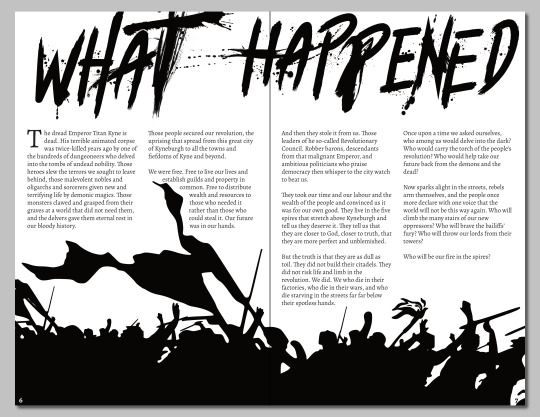
A Torch in the Dark is one of my first games, and to this day one of my most popular. I've never done a sequel before, but I've had this idea for a while now, and wanted to give folks who loved Torch more lore, more ways to play, and more gruesome and wretched rich people to kill.
Fire in the Spires uses the Forged in the Dark rules system, splitting game play into two phases: climbs and downtime. In climbs you assemble a crew of rebels each with a single unique trait. You combine these traits together with spire modifiers and encounter complications to build a die pool, which determines if your crew will ascend, or be weighed down by stress and damage.
When your climb is done, you return to the streets, cross days of the new People's Calendar, and do your best to recover and recruit before your next climb.
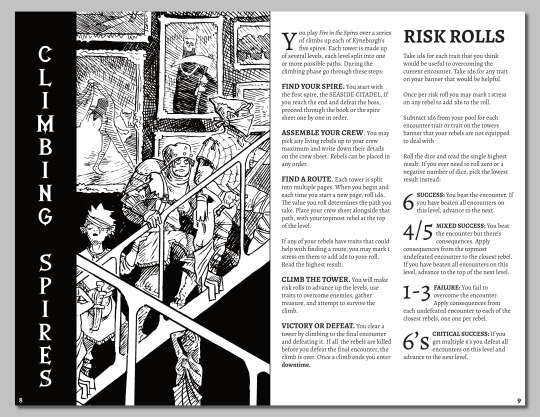

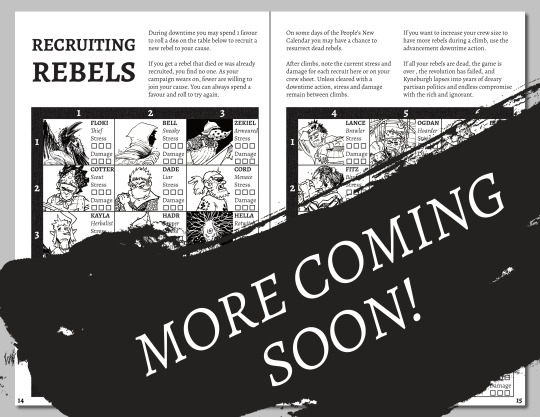
Fire in the Spires is a standalone sequel. You don't need to have read or played Torch to get it. But if you'd rather take your favourite delver through five new dungeons and hundreds of new encounters, you can. I'll be including instructions about how to mash the two games together, if you want to treat Fire in the Spires as more like an expansion.
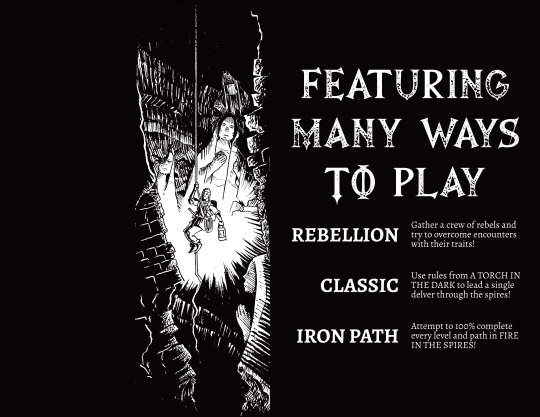
Also, if you missed your chance to get a printed copy of A Torch in the Dark, I'm doing a rare second printing. You can get digital copies as an add-on, or back at certain tiers to get the physical copy.
Check it out on Kickstarter now. Spread the word. Tell your allies. Scream it at your enemies.
Once we asked people to be a torch in the dark. Now, when Kyneburgh needs you again, will you be our fire in the spires?
#indie ttrpg#ttrpg#rpg#solo ttrpg#tabletop#dungeons and dragons#singleplayerttrpg#singleplayer#ttrpgs#rpgs#fantasy#forged in the dark#fitd#a torch in the dark#fire in the spires
46 notes
·
View notes